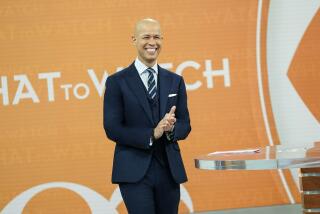Scott Pelley to succeed Katie Couric as ‘CBS Evening News’ anchor
After luring Katie Couric away from NBC’s “Today” show in an attempt to revamp the evening news with star power and broad appeal, CBS News has made a more traditional choice in tapping “60 Minutes” correspondent Scott Pelley to succeed Couric. He will take up the anchor role on “CBS Evening News” starting June 6, the network announced on Tuesday.
As an internal hire and a veteran newsmagazine reporter, Pelley is many things that Couric was not. Where Couric brought a conversational, accessible style from her morning show background, he represents the network’s return to a more sober, direct approach.
During an interview on Tuesday, Pelley, who has spent more than two decades at CBS, said that he intended to bring a “60 Minutes” sensibility to the “Evening News” by focusing on “original reporting, unique insights, and fairness to everyone involved in the story.” He also wants to pursue more of the longer-form investigative journalism that’s helped him make a name for himself on “60 Minutes.”
CBS News Chairman and “60 Minutes” Executive Producer Jeff Fager said that with Pelley on board, the evening news will be more aggressive about breaking news. “Scott’s covered every type of story imaginable, more than any other reporter in his generation,” says Fager. “He’s been everywhere, and to me, that results in credibility.”
During his time at CBS, Pelley has reported from Iraq and Afghanistan, served as a White House correspondent, and recently covered late-breaking stories such as the Japanese tsunami.
According to Pelley, one of CBS News’ larger goals is to create more cross-pollination between “60 Minutes” and the evening news, which are both part of CBS News but are housed in separate buildings. Pelley will continue to contribute a significant number of stories each season to “60 Minutes” and says he plans to beef up the team there.
Though the anchor position may bring Pelley a higher profile, it won’t necessarily come with a bigger audience: “60 Minutes” is America’s top-rated weekly newsmagazine, with an average of 15 million viewers each Sunday, while the “CBS Evening News” ranks last among the daily network newscasts, averaging 5 million to 6 million viewers on weekdays. One of Pelley’s biggest challenges will be to help “CBS Evening News” climb out of last place: It currently lags behind “NBC Nightly News” and ABC’s “World News.”
Asked why he believes the newscast has been stuck in third place, Pelley demurred, citing the many awards Couric won during her time there. But Andrew Tyndall, who writes a popular newsletter about the network news broadcasts, wondered if CBS set an impossibly high bar for Couric’s success by awarding her a $15-million salary and announcing her move from NBC’s “Today” to the “CBS Evening News” with such fanfare when she arrived in 2006.
“Other anchors have become big personalities because of what they’ve done on the job, whereas Katie Couric’s personality was already fully formed when she arrived,” says Tyndall. “So much of this is an expectations game. And I don’t think people have the same expectations of Scott Pelley.”
Pelley might also help the network rein in its budget. While his salary is unknown, it’s almost certainly downsized from Couric’s. Last October, CBS President and CEO Les Moonves told a crowd at the University of Texas that Couric’s $15-million contract “will be the last big deal of that kind ever done.”
At a time when ratings for the evening news are down across all networks, however, Pelley will likely face daunting challenges.
“The problem is that nobody watches the evening news anymore, other than people who are over the age of 65,” says Christopher Harper, a professor at Temple University and a former ABC News correspondent. “And that audience is going to die off. The future of television news is based on appealing to college students, and they connect more with Jon Stewart and Stephen Colbert, because [they think] news programs talk down to people.”
Fager said he isn’t too worried about appealing to a younger demographic.
“We try to appeal to viewers of all ages,” he says. “You don’t pander to young viewers by changing your broadcast.” Besides, he said, “younger viewers aren’t watching that broadcast, they’re getting their news online, so we’re working hard on building our website and making it better.”
Pelley knows he has a tough job ahead of him. But he said being an anchor will be the least important part of his job. Like his predecessors, including Walter Cronkite, he will also serve as managing editor for the newscast.
“That’s the most important thing: First thing in the morning, getting with the senior producers and figuring out what news we’re going to cover, then working with the correspondents on creating that coverage, and at the end of the day, working on the scripts, sending the correspondents back for additional reporting and rewrites,” he says.
“When we’re number one, we’ll celebrate,” he promised. “Until then, it’s all work.”
More to Read
The biggest entertainment stories
Get our big stories about Hollywood, film, television, music, arts, culture and more right in your inbox as soon as they publish.
You may occasionally receive promotional content from the Los Angeles Times.










